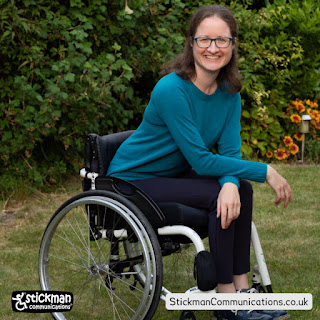There are 2 main ways of referring to disability.
One is 'person first' - that comes from the medical model and is used extensively within the medical profession.
"I am a person with a disability"
The problem is the medical condition. Putting the person first creates distance between the person and the 'problem' (as percieved in this model) and emphasises the individual.
The other is 'disability first' - associated with the social model:
"I am disabled."
People with impairments are disabled by barriers in society. These barriers can include physical (e.g. access ramps), informational (e.g. braille not provided), sensory (e.g. harsh lighting, loud noise) and attitudinal (e.g. "you don't look disabled therefore you are faking it and I won't allow the adjustments you have requested.").
The problem is the barriers.
It's worth noting that while the social model is a great way of helping organisations understand that they are responsible for many of the barriers that disabled people face, not all disabled people relate to it completely on a personal level. Some conditions do 'cause problems' that can't be addressed by societal change. (For example if my wrist dislocates and means I can't push my wheelchair, there isn't anything society could have done to prevent that increase in disability caused by my condition).
When are the different terms used, and why?
While the two political models above do play a part in language choices, there are many other factors too. From my experience and observation, use in the disabled communities is frequently as follows:
- Newly diagnosed (and parents/carers of) – almost exclusively use person first (medical model).
- Experienced patient – majority use disability first (social model).
(with a mixed use area between).
When you think about it, this makes sense.
- Newly diagnosed people have received their language from the medical profession.
- Newly diagnosed people are often going through symptoms which seem to be taking away key parts of who they are. I experienced this. It felt like my condition was taking away my career, my social life, my hobbies - my very value as human being. Everything felt like it was being swamped by my condition. Person first language can be a valuable reminder for both the person with the disability and people around them that contrary to how it feels, they are still a person - still part of society, and still of value. They just happen to have a disability.
But over time those symptoms usually become (to some extent) understood, and an arsenal of coping strategies and management techniques/aids/adaptations is built. In addition, a new lifestyle that works for our body and brain has often become the norm. Where we are fighting for access and support it isn't our disability we are fighting against, it's inaccessible systems, attitudes, red tape, and a lack of understanding. The very things that the social model focuses on. In addition, the 'distance' from the impairment/disability present in the medical model no longer makes sense. Disability has become a normal part of life and is not automatically bad - it just exists.
We also use 'characteristic first' language in most areas of talking about our lives (I'm brunette, blue-eyed, bright, occasionally funny etc) so as disability becomes a personal normal, and 'just another one of my characteristics' it is natural for language patterns to follow those for other characteristics. In addition, having other people emphasise that I am a person through their person first language can feel weird, artificial, and patronising - are they so blinkered that they genuinely need reminding that I'm a person?
Many autistic and neurodivergent adults exclusively use disability first language when referring to their neurology. (e.g. "I am autistic") because their neurology is not something they carry with them, or something held at a distance. It is a whole way of processing the world and interacting with it, intrinsic to their very identity and being. I'd say it is even more intrinsic than things like faith, nationality, etc, where identity first language is the norm - saying "I have Englishness" would be absurd.
So which term should be used?
My advice would be:
- if you are an organisation, at policy level use the social model - accept and own your responsibility for dealing with the barriers that it is within your power to remove or reduce.
- if you are communicating with an individual or a specific patient group, be led by their language choice.
- if you are a patient, use whatever you want, whenever you want. Use what works for you at the moment you are in.

Comments
Post a Comment
Feel free to comment, but please note that any offensive or inappropriate comments - including advertising - will be moderated.